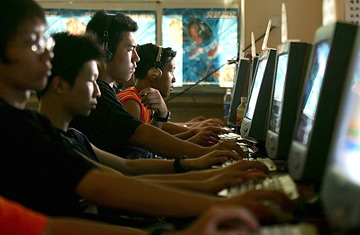
Chinese youths at an Internet cafe in Beijing, China.
Like virtually everything in China these days, Internet usage is ballooning at a barely credible rate. A decade ago, the number of users was less than a million; now, a staggering 162 million Chinese have direct access to the Web. If growth continues at this blistering pace, China will to overtake the U.S. by the end of 2007 to boast the world's largest population of netizens.
As in the rest of the world, Internet usage is heaviest among the young and male, so it's no surprise that one of the most popular pursuits online is playing MMORPG, or Massively Multiplayer Online Role Playing Games. Walk into any of the internet cafes that dot most Chinese cities and the same scene is repeated: Through a haze of cigarette smoke, scores of heads can be seen bent over screens reflecting scenes of knights astride steeds, spaceships hurtling through space, SWAT teams on the run and the like. From the hugely popular World of Warcraft to Conan the Barbarian and Star Wars Galaxies, some of the games are familiar names to gamers the world over. There are also games exclusive to China, such as Fantasy Journey to the West, a riff on one of the country's most famous legends. More than $1 billion will be spent on these games this year alone, by some 43 million players.
Concerned that so many young people have become addicted to online play, the government has introduced a scheme to limit the number of hours participants can play. Under-14s (players must enter their ID card numbers to get access) are limited to two hours a day, while those between 14 and 18 are allowed four hours, after which they are logged out of the game. For those whose addiction prompts them to cheat the system, the authorities offer worried parents deprogramming boot camps run in unused military barracks, where pale and pudgy teenagers are put through a two-week regimen of exercise, regular sleep and meals — and no Internet.
China's official attitude to the Internet, however, is by no means all negative. Three hundred police in the port city of Tianjin, for example, spent a recent weekend ensconced in internet cafes battling each other in the counter-terrorism online game Counter Strike. More intriguing, still, was short but popular life of an online game called Incorruptible Warrior. Commissioned and released by a local authority in the center of the country, the game was set in ancient China but had a very contemporary theme — the battle against corruption. Players took on the role of historical figures such as the grim faced Judge Bao, a famously upstanding Song Dynasty official who died in 1062. After getting marching orders from the Emperor, players accumulated points by eliminating corrupt officials. Although the game had crude graphics, crashed frequently and was highly derivative, it became an overnight sensation and attracted both media attention and thousands of players, which must have pleased its backers, the Communist Party Discipline Inspection Commission of Haishu District, Ningbo City, Zhejiang Province.
But the Incorruptible Warrior was abruptly retired after only a few days. While it isn't exactly clear why the game was closed down or by whom, it may have been a little too exciting for official tastes. Players gained their points not by arresting officials, but by beheading them and their entire families as well as their mistresses, who were in the habit of walking around in their bikinis before getting the chop. Obviously, the very things that made the game popular also doomed it.
It also seems to have occurred to the powers that be that players might not actually be learning "correct thinking," as intended, but instead they might just be enjoying a little vicarious revenge on officialdom. As a sniffy commentary from China's official news service Xinhua noted: "We have to admit the theme of the game is more positive and healthy than the ones that promote violence. But... it makes a game of a serious anti-corruption campaign." The central government is, in fact, in the midst of a huge anti-corruption campaign, with rumors swirling in the capital of imminent further arrests of senior officials to follow up on the steady parade of chastened senior bureaucrats that have appeared in the official media in the last year — the former head of China's Food and Drug Administration was executed for corruption in July. But whether they occur in the real world or the virtual one, Beijing evidently wants to maintain total control of who sanctions executions of officials.
